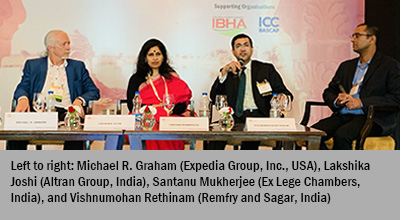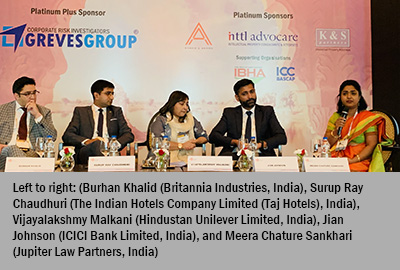Registrants Gain Insight on Brand Protection Trends at 2019 India Workshop in New Delhi, India
Published: October 15, 2019
Niti Dewan R K Dewan & Co. Mumbai, India
 More than 150 intellectual property (IP) lawyers, in-house attorneys, corporate professionals, and members of the INTA Board of Directors attended INTA’s India Workshop in New Delhi, India, September 25. Discussions centered on the latest developments and emerging trends in trademark protection and litigation in India, international systems related to the graphical representation of nontraditional trademarks, and the evolution of artificial intelligence in the IP industry. The Workshop came the day after INTA’s first-ever Board meeting held in India.
More than 150 intellectual property (IP) lawyers, in-house attorneys, corporate professionals, and members of the INTA Board of Directors attended INTA’s India Workshop in New Delhi, India, September 25. Discussions centered on the latest developments and emerging trends in trademark protection and litigation in India, international systems related to the graphical representation of nontraditional trademarks, and the evolution of artificial intelligence in the IP industry. The Workshop came the day after INTA’s first-ever Board meeting held in India.
Throughout the workshop, key trademark issues were discussed by eminent IP lawyers and corporate legal practitioners, as well as representatives of India’s Joint Commissioner of Customs and such brands as Altran Group (India), Britannia Industries (India), Expedia Group Inc. (USA), Hindustan Unilever Limited (India), ICICI Bank Limited (India), and Taj Hotels (India).
Keynote Speaker Justice Rajiv Sahai Endlaw of the Delhi High Court opened the event by sharing insights on a variety of trademark infringement cases he has handled. He also touched on the latest developments related to the procedure of examination and registration of trademarks, and transparency in trademarks prosecution at the Indian Patent and Trade Marks Office.
During Session I, “Emerging Trends in Trademark Protection and Litigation in India,” Gladys Daniel (Daniel & Gladys, India) discussed how damage rewards granted by Indian courts in trademark cases have increased over the years. Ms. Daniel highlighted an antiquated case in which the plaintiff was granted damanges in the amount of approximately US 15 cents. Today, she noted, the scenario has drastically changed, and courts are acknowledging the importance and value of IP rights (IPR). To illustrate this point, Ms. Daniel cited a recent court order by the Bombay High Court (Shalina Laboratories Pvt. Ltd. v. Twin Impex and National Laboratories, Sept. 10, 2018-plaintiff’s trademark “TANZOL” and defendant’s trademark “INASOL”) in which heavy damages of approximately US $20,6340 were awarded to the plaintiffs.
The panelists went on to discuss the provisions of the Trade Marks Rules, 2017 related to the protection of well-known trademarks in India. Saikrishna Rajagopal (Saikrishna & Associates, India) noted that well-known trademarks can be protected by obtaining an order from an appropriate court, and an application for the declaration of a trademark to be designated as “well-known” can also be filed before the Registrar of Trademarks along with relevant evidence. The establishment of commercial courts in India and its significance in providing protection to original and lawful trademark owners was also discussed by the panelists.
 In Session II, “The Need for a National IPR Centre in India,” Elliott Harbin (Department of Homeland Security Investigations, USA), Udaykiran Devineni (Homeland Security Investigations, India), and Joint Commissioner of Customs Subodh Singh emphasized the need for the establishment of a National IPR Centre in order to ensure effective IPR policy and coordination among various departments of the Indian government and the judiciary, for the effective enforcement of IPR, and actions against piracy, counterfeiting, and IP crimes.
In Session II, “The Need for a National IPR Centre in India,” Elliott Harbin (Department of Homeland Security Investigations, USA), Udaykiran Devineni (Homeland Security Investigations, India), and Joint Commissioner of Customs Subodh Singh emphasized the need for the establishment of a National IPR Centre in order to ensure effective IPR policy and coordination among various departments of the Indian government and the judiciary, for the effective enforcement of IPR, and actions against piracy, counterfeiting, and IP crimes.
Panelists focused on the topic of nontraditional trademarks in Session III, “Graphically Yours: Trademarks.” Surup Ray Chaudhuri (The Indian Hotels Company Limited (Taj Hotels), India) shared his experience during the process of obtaining trademark registration for the TAJ Hotel edifice. He noted that his company had benefited financially from licensing fees gained from companies using the image of the hotel since the building became a registered trademark.
Overall, the active participation of both speakers and registrants made the India Workshop a lively forum for information sharing relating to the latest developments in the field of IPR in India and cooperation and coordination among stakeholders at the national and international level.
Although every effort has been made to verify the accuracy of items in the INTA Bulletin, readers are urged to check independently on matters of specific concern or interest.
© 2019 International Trademark Association
This website uses cookies so that we can provide you with the best user experience possible. Cookie information is stored in your browser and performs functions such as recognising you when you return to our website and helping our team to understand which sections of the website you find most interesting and useful.
To find out more please see our Cookies Policy and Privacy Policy.
These cookies are used to identify a user’s browser as the visitor goes from page to page on the Site. These are session cookies, which means that the cookie is deleted when you leave the Site. It is an integral piece of the Site software and used to let the server know which users are on the Site at any given time and make certain parts of the Site easier to use.
|
|
If you disable this cookie, we will not be able to save your preferences. This means that every time you visit this website you will need to enable or disable cookies again.
These cookies are used to collect information about how visitors use our Site. The cookies collect information in anonymous form, including the numbers of visitors to the Site, where visitors have come to the Site from, the pages they visited and how they have interacted with tools on the Site like search and embedded media players. We use the information to compile statistical reports of our users’ browsing patterns so that we can improve the Site.
|
|
Please enable Functionality Cookies first so that we can save your preferences!
These cookies are used to deliver advertising relevant to the interests of visitors to our Site. They are persistent, which means they will remain on your device after you leave the Site.
- Facebook (Ad Pixel)
- Google (Ad Pixel)
- LinkedIn (Ad Pixel)
- Quattro Anonymous
Please enable Functionality Cookies first so that we can save your preferences!
